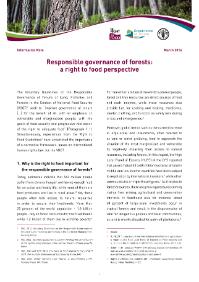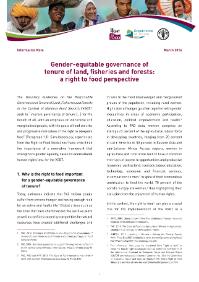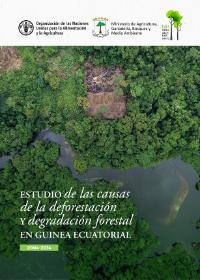Focal point
Location
The Food and Agriculture Organization of the United Nations leads international efforts to defeat hunger. Serving both developed and developing countries, FAO acts as a neutral forum where all nations meet as equals to negotiate agreements and debate policy. FAO is also a source of knowledge and information. We help developing countries and countries in transition modernize and improve agriculture, forestry and fisheries practices and ensure good nutrition for all. Since our founding in 1945, we have focused special attention on developing rural areas, home to 70 percent of the world's poor and hungry people.
Members:
Resources
Displaying 401 - 405 of 5074Responsible governance of forests: a right to food perspective
In light of the endorsement of the Voluntary Guidelines on the Responsible Governance of Tenure of Land, Fisheries and Forests in the Context of National Food Security (VGGT), this Information Brief aims to provide concise and practical elements for a responsible governance of forests. Developed jointly with the FAO study The Right to Food and the Responsible Governance of Tenure: A dialogue towards implementation, this Information Brief offers a right to food perspective on a crucial governance matter for the implementation of the VGGT.
Gender-equitable governance of tenure of land, fisheries and forests: a right to food perspective
In light of the endorsement of the Voluntary Guidelines on the Responsible Governance of Tenure of Land, Fisheries and Forests in the Context of National Food Security (VGGT), this Information Brief aims to provide concise and practical elements for a gender-equitable governance of tenure of land, fisheries and forests. Developed jointly with the FAO study The Right to Food and the Responsible Governance of Tenure: A dialogue towards implementation, this Information Brief offers a right to food perspective on a crucial governance matter for the implementation of the VGGT.
Responsible governance of tenure in fisheries: a right to food perspective
In light of the endorsement of the Voluntary Guidelines on the Responsible Governance of Tenure of Land, Fisheries and Forests in the Context of National Food Security (VGGT), this Information Brief aims to provide concise and practical elements for a responsible governance of fisheries. Developed jointly with the FAO study The Right to Food and the Responsible Governance of Tenure: A dialogue towards implementation, this Information Brief offers a right to food perspective on a crucial governan ce matter for the implementation of the VGGT.
Estudio de las causas de la deforestación y degradación forestal en Guinea Ecuatorial 2004-2014
El presente estudio sobre las causas directas y subyacentes de deforestación y degradación de los bosques en Guinea Ecuatorial se ha realizado en el marco del proceso de desarrollo de la Estrategia Nacional REDD+ (EN-REDD+) y del Plan Nacional de Inversión REDD (PNI-REDD+). La EN-REDD+ y el PNI-REDD+ aspiran a guiar y apoyar los esfuerzos de todas las partes implicadas en la implementación de REDD+ , que tiene como objetivo reducir las emisiones, aumentar el secuestro de carbono en los bosques y mejorar la gestión y conservación de las reservas forestales de carbono.
Putting the Voluntary Guidelines on Tenure into practice: A Learning guide for civil society organizations
Putting the voluntary guidelines on tenure into practice: a learning guide for civil society organizations is a learning guide which has been designed specifically to give civil society and grassroots organizations a deeper understanding of the VGGT. It provides civil society organizations with a methodology and a set of materials to undertake training on the VGGT with civil society actors from the grassroots to the national level. Trainees will learn how to apply the VGGT to actual tenure gover nance.











